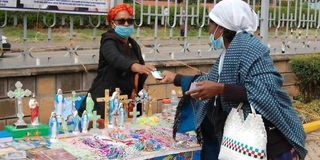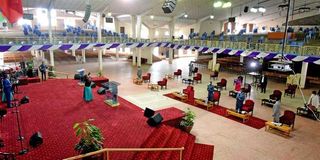Premium
Services resume as churches strive to abide by the rules

Worshipers at Legio Maria Church in Kibera, Nairobi. PHOTO | YASUYOSHI CHIBA | AFP
What you need to know:
- In Nyandarua County, at the Jesus Revival Centre in Kinangop, Bishop John Kairu held five services each with one hundred attendants.
- At the Cathedral Church of Christ the King in Nakuru, most of the faithful did not attend Mass.
Some churches have controlled the activities that worshippers have come to regard as integral to the service such as singing and greetings.
Communal worship resumed on Sunday after a four-month break caused by the outbreak of Covid-19.
Churches had to devise creative ways to accommodate all worshippers given the restrictions on attendance that were put in place by the government as part of the conditions for a phased reopening.
The Interfaith Council the Health ministry set up needed to have hand-washing stations with soap and sanitisers, wear face masks, maintain a sitting distance of 1.5 metres, and protect the vulnerable — children under 13 years and adults over 58 years.

Worshippers pray at the Mombasa Pentecostal Church on July 19, 2020. PHOTO | WACHIRA MWANGI | NATION MEDIA GROUP
“Let us take the responsibility to ensure that the disease does not spread. The reopening will be done in five phases and we must adhere to the guidelines,” said the council’s chairman, Archbishop Anthony Muheria. For the last three months, churches had resorted to online services, but this was not universally accessible as some worshippers lacked internet bundles while others had challenges with the technology.
In Nyandarua County, at the Jesus Revival Centre in Kinangop, Bishop John Kairu held five services each with one hundred attendants.
In Ruaka, Kiambu County, worshippers at the Catholic Church were allowed in on a first-come, first-served basis. They were required to sign in, pick a token and sanitise before entering. An usher stood at the entrance to check temperatures.
At the Redeemed Gospel Church, also in Ruaka, ushers monitored the number of people coming in by counting them. Two people were allowed to share one bench, with each person sitting on either end.
At the Cathedral Church of Christ the King in Nakuru, most of the faithful did not attend Mass. Fr Lawrence Mbogo said the few who came were allowed to worship even though some of them were elderly.
“It is hard to turn away a worshipper who has come to pray and I would rather celebrate Mass for that one person than tell that person to go back home,” said Fr Mbogo, as he encouraged parents to take care of their children’s spiritual needs.

Attendants register at the Sacred Heart of Jesus Cathedral in Eldoret. PHOTO | JARED NYATAYA | NATION MEDIA GROUP
In a circular sent to its pastors, Presbyterian Church of East (PCEA) deputy secretary Reverend Paul Kariuki forbade cash offerings and directed the worshippers to pay via M-Pesa.
The services, normally about five hours, lasted an hour each. The praise and worship session, which is normally an hour, was reduced to five minutes, less time than the health information updates which took eight minutes.
Mr David Ndegerege, a pastor at PCEA Thome in Nairobi, said only 30 people were allowed into the church because of the poor ventilation of the building.
At the Africa Inland Church (AIC), health committees have been formed at each parish to educate church leaders and the congregation on Covid-19 — for instance, how to identify when one needs medical attention and proper ways to wear a face mask.
At the Elshadai Restoration Ministry in Maralal, which normally hosts up to 400 members, only 70 members attended.
Before entering the church compound, ushers wearing masks and reflector jackets took worshippers’ temperatures at the gate and ensured they washed their hands.
Some churches have controlled the activities that worshippers have come to regard as integral to the service such as singing and greetings.

A church official sells religious items at the Cathedral Church of Christ the King Catholic Diocese of Nakuru on July 19, 2020. PHOTO | FRANCIS MUREITHI | NATION MEDIA GROUP
Studies, such as the one carried out by Dr Joshua Santarpia at the University of Nebraska Medical Centre in the United States, found that standing next to an infected person increased one’s risks of contracting Covid-19 regardless whether the individual spoke or not.
An infected person, the study established, had the capacity to exhale virus particles, which a healthy person could inhale when standing a metre-and-a-half away.
Churches that have found it extremely hard to run the services like Christ is the Answer Ministries (Citam) in Nakuru remained closed, with just a few employees being seen within the compound.

A service at the Redeemed Gospel Church in Huruma in Nairobi yesterday. The 15,000-seater church had only a handful of worshippers. PHOTO | SALATON NJAU | NATION MEDIA GROUP
The church had announced through a circular that it had chosen to remain closed.
For a majority of Kenyans, the pandemic has negatively affected worship and other ways of life.
According to the Kenya National Bureau of Statistics, four in five Kenyans identify as Christians.
The 2019 national census reported that there are 15,777,473 Protestants (the majority), 9,726,169 Catholics and 9,648,690 evangelicals.
Other Christian minorities include the 3,292,573 members of the African instituted churches such as the Dini ya Musambwa, Orthodox (201,263) and other Christians (1,732,911).
The number of Kenyans who regularly attend a church service has remained steady over the years, at least, according to American think-tank Pew Research, but it is estimated that one in three Kenyans attend religious services weekly.
Reporting by Waikwa Maina, Macharia Mwangi, Francis Mureithi, Geoffrey Ondieki, Barnabas Bii, Titus Ominde, Onyango K'Onyango, Tom Matoke, Sarah Nanjala and George Odiwuor


